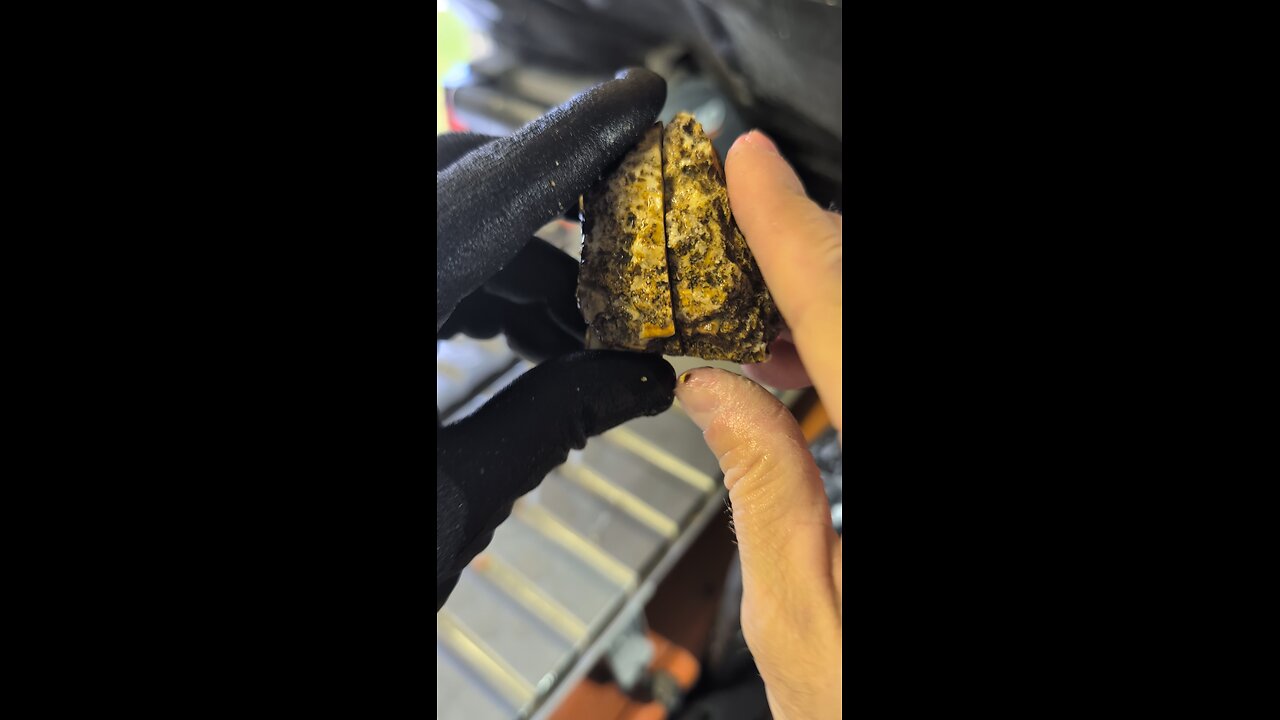Premium Only Content

Bit of opal in there!
An agate nodule is a type of geological formation where agate, a variety of chalcedony (which is a microcrystalline form of quartz), forms within a nodule. Here's a more detailed explanation:
Formation: Agate nodules typically form in volcanic rocks, especially in cavities or vesicles left by gas bubbles in lava flows, or in sedimentary rock layers where silica-rich solutions seep into voids or around organic matter. Over time, these solutions deposit layers of silica, which eventually harden into agate.
Structure:
Nodule: The term "nodule" refers to a rounded mass embedded in rock. In the case of agate, the nodule often has a concentric or banded appearance due to the way silica layers are deposited.
Bands: Agate nodules are famous for their colorful, concentric bands, which can vary widely in color due to different mineral impurities present during formation.
Appearance: Agate nodules can be quite varied:
External: Often, the outside of the nodule is less colorful, sometimes covered by a layer of rough, less translucent rock material.
Internal: Once cut or polished, the inside reveals the banded, translucent to semi-transparent agate with patterns that can be quite intricate, including eye-like formations, landscapes, or even dendritic patterns if manganese or iron oxides are present.
Uses:
Jewelry and Ornamentation: Due to their beauty and durability, agate nodules are cut into cabochons for jewelry, sliced into slabs for decorative items, or simply polished as display pieces.
Metaphysical: Some cultures attribute healing or spiritual properties to agate, using them for various forms of alternative therapy or as protective amulets.
Locations: Agate nodules can be found in numerous places around the world where conditions for their formation exist, including Brazil, Uruguay, Mexico, the United States (notably in Oregon for its famous thundereggs, which are a type of agate nodule), and parts of Europe.
-
 1:03:27
1:03:27
Glenn Greenwald
5 hours agoUK Pressures Apple to Break Encryption in Major Privacy Clash; How Dems Can Win Back the Working Class: With Former Bernie Sanders Campaign Manager Faiz Shakir | SYSTEM UPDATE #419
37.8K42 -
 47:39
47:39
Michael Franzese
4 hours agoJewelry King Trax NYC EXPOSES How the Powerful Steal from You
45.3K8 -
 LIVE
LIVE
Slightly Offensive
3 hours ago $2.86 earnedCandace REDPILLS the Masses in BOMBSHELL Theo Von Interview | Guest: Shane Cashman
1,181 watching -
 LIVE
LIVE
megimu32
3 hours agoON THE SUBJECT: IRL Streamers Attacked & Nostalgic Animal Movies That Made Us Cry
594 watching -
 1:00:54
1:00:54
The Tom Renz Show
7 hours agoMore Epstein/FBI, a Scary Trade War, & the Dem Echo Chamber
7.49K1 -
 40:43
40:43
Kimberly Guilfoyle
8 hours agoDems Double Down on Delusion-Why? Live with Tony Kinnett & Bo French | Ep.202
77.8K33 -
 1:28:42
1:28:42
Redacted News
6 hours agoBREAKING! SOMETHING BIG IS HAPPENING IN EUROPE ALL OUT WAR IS COMING AGAINST RUSSIA, TRUMP FURIOUS
121K283 -
 47:50
47:50
Candace Show Podcast
6 hours agoBREAKING: Judge Makes Statement Regarding Taylor Swift's Text Messages. | Candace Ep 155
113K113 -
 1:14:23
1:14:23
Josh Pate's College Football Show
3 hours ago $0.29 earnedCFB’s Most Hated Teams | FSU & Clemson Future | Big Ten Win Totals | Star Rankings Overrated?
14.5K -
 1:33:47
1:33:47
CatfishedOnline
5 hours agoGoing Live With Robert - Weekly Recap
27.8K